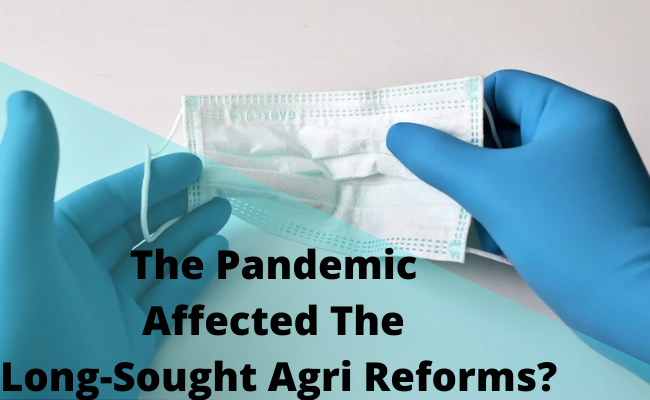
The government has shifted the crisis of pandemic to good account as it pushed through lengthier sought-after legislative alterations that are aimed at highly remunerative costs for the farmers. However, along the way, it ended up antagonishing the states.
Among many remarkable changes, one is altering the old Essential Commodities Act, which brought in a law that dismantled the barriers of inter-state on agriculture produce’s movements and also formed a lawful framework for a type of contract farming.
Additionally, the Centre is required to wait for the monsoon session of the Parliament or bring forward Ordinances on these matters. Perhaps for the very first time, the Centre has made its mind to frame legislation that will allow direct buying process from the farmers who are not within the chosen APMCs (agricultural produce marketing committees) thus confining the role of a state in these kinds of trades.
In the Constitution, it made use of its powers for regulating intra- and inter-state trade in particular commodities. Nirmala Sitharaman, the Union Finance Minister announced it as a portion of the package of Atmanirbhar Bharat. It will allow traders to purchase farm produce directly from the farmers in the country and it can also stretch to the controlled market yards.
It would bring forward barrier-free and inter-state trade besides boosting the e-NaM (Electronic-National Agriculture Market) programme. However, e-NaM was not having the anticipated effect as free inter-state was not permitted for goods that were dealt with on the platform and several pieces of states’ legislation can be held responsible for this.
The Central legislation along with the current amendments of APMC by the BJP-ruled states of various states, like Uttar Pradesh, Madhya Pradesh, Karnataka, and Gujarat provided a framework meant for big companies and retailers to buy from farmers and they are not required to go through an entire network of mediators.
The states’ current changes permit setting up various private mandis, single license, and processors’ direct procurement in the state. Nonetheless, according to critics, bypassing states through the Constitution’s appeal of previously unheard provisions can result in problems for the country’s federal structure as it will confine the powers of the state to the mandi which is within their boundaries. Presently, APMC-notified mandis need to sell particular products necessarily on either their premises or within the designed areas.
Sukhpal Singh, the chairperson and professor of the Centre for Management of Agriculture, Indian Institute of Management, Ahmedabad told that the Centre has done the job of tapping of the Constitution for defining any business which happened outside the APMCs because trade can be centrally legislated.
He also said that the reforms happened to be good if they had managed to lead to enhanced costs for farmers with the extracting of the role of the states in trading outside the chosen APMCs.
If a senior government official is to be believed that mandis would operate like they did before but the novice legislation would allow direct procurement through entities that are outside mandis. The 2nd vital information that Sitharaman announced was amending the ECA (Essential Commodities Act, 1954 for bringing out products, like edible oils, cereals, pulses, oilseeds, potatoes, and onions from its purview.
In her presentation, the minister said that measures like stock limits would be permitted to get imposed but only in some exclusive conditions, such as famines with an escalation in prices and national calamities.
The Act was in operation for several years and it has got whittled down and so, only some components continue to remain inside its ambit and after this announcement has been made, even those items will go.
The 3rd reform is a kind of Central law that is useful for contracting farming and it is enforceable in states. The model Act contracts farming though only some states do implement it wholly.
According to a senior official, a need was there for framing Central legislation so that it could contract farming as states had not involved themselves in applying the model Act in its true spirit.
Stay connected with fellow students on PaGaLGuY for CAT Exam 2020 Discussion
Source – Business Standard
